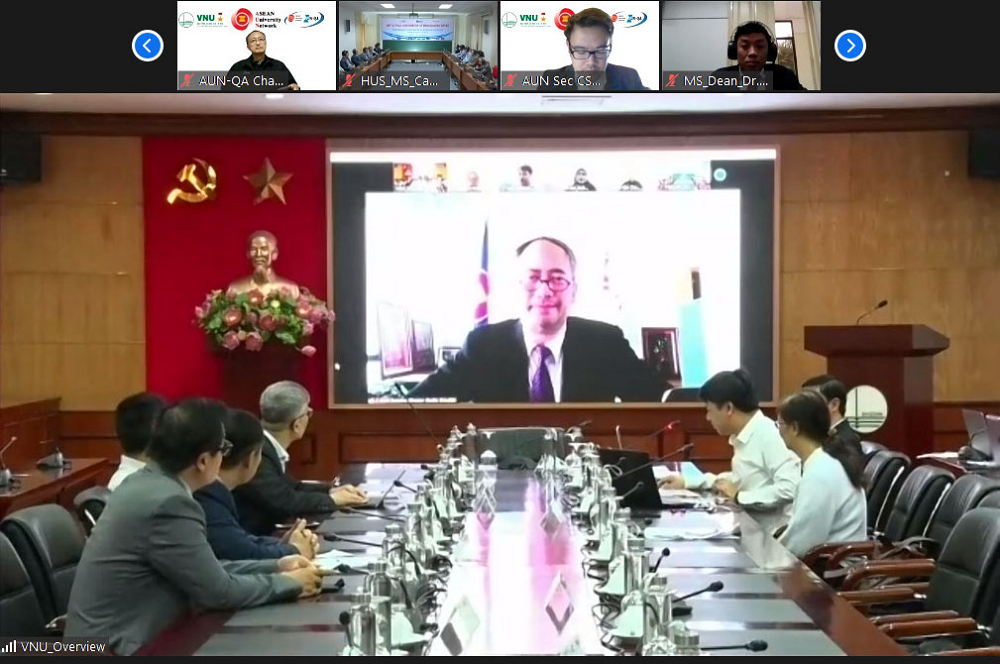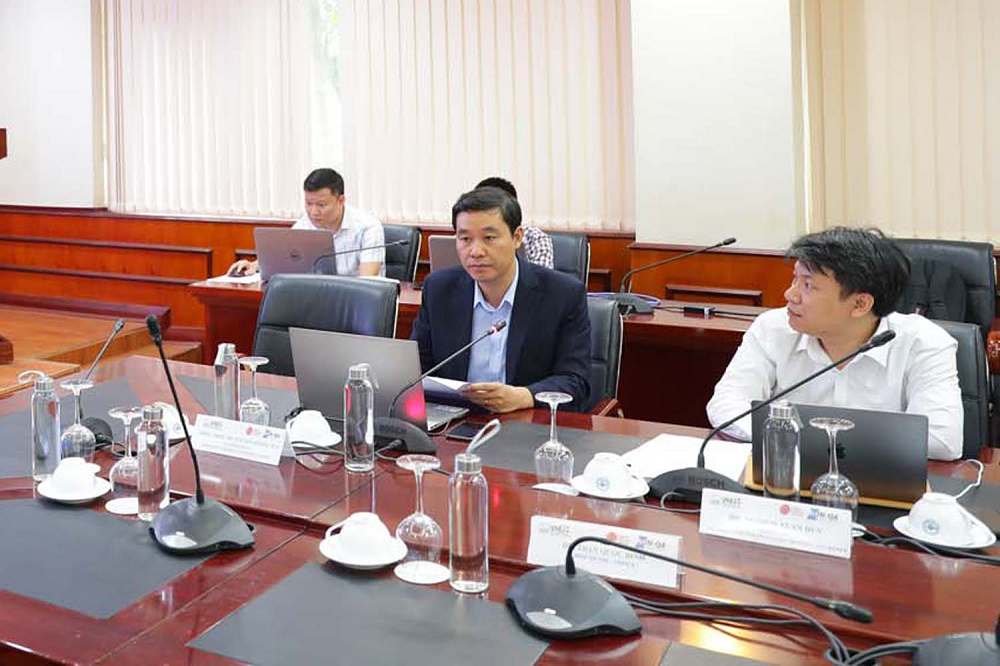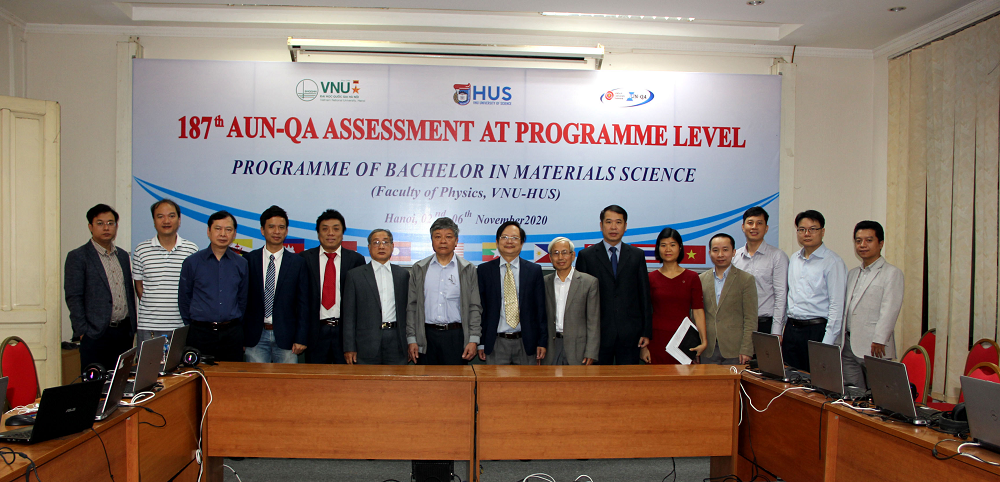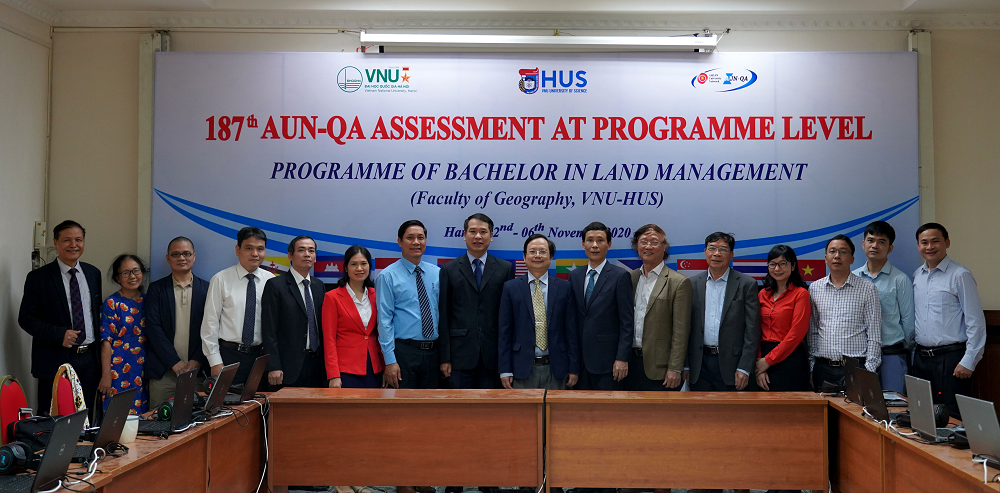From November 2nd to 6th, 2020, Vietnam National University Hanoi and the ASEAN University Network (AUN) are conducting online accreditation of 04 training programs, two among which are from VNU-HUS.
This is the 187th quality assessment of AUN-QA for the training programs of Vietnam National University Hanoi (VNU). The Programmes of Bachelor in Materials Science and in Land Management are evaluated. Due to the Covid-19 epidemic, the AUN-QA’s evaluation teams do not visit the facilities but carry the job online.
 Dr. Choltis Dhirathiti, Executive Director, ASEAN University Network speaking at the Opening Ceremony. (Photo was taken at VNU-HUS)
Dr. Choltis Dhirathiti, Executive Director, ASEAN University Network speaking at the Opening Ceremony. (Photo was taken at VNU-HUS)
Speaking at the opening ceremony, Assoc. Prof. Dr. Nguyen Hoang Hai, VNU Vice President, said: “VNU has always been striving to meet international standards to better serve the country. Quality accreditation and evaluation according to international standards always have a positive impact on improving the quality of training programs. Evaluation from AUN-QA experts will help identify the strengths and weaknesses of training programs, thereby helping to propose effective measures to improve quality. VNU will continue to strive to achieve higher quality in teaching and learning in all training programs”.
 Assoc. Prof. Dr. Nguyen Hoang Hai, VNU Vice President (top row, left) at the Opening Ceremony of the AUN-QA’s 187th Quality Assessment of VNU training programs.
Assoc. Prof. Dr. Nguyen Hoang Hai, VNU Vice President (top row, left) at the Opening Ceremony of the AUN-QA’s 187th Quality Assessment of VNU training programs.
 Participants in the online Opening Ceremony
Participants in the online Opening Ceremony
The Bachelor in Materials Science (Faculty of Physics, VNU-HUS) equips students with the fundamental knowledge of Physics, Mathematics, Informatics, Chemistry, Materials Science and Technology, especially nano-electronic materials (magnetic materials, semiconductor materials). Students are also equipped with knowledge of other advanced materials such as special alloys, composites, nanomaterials, opto-electronic materials used in many fields such as fiber optic cables or lasers, the materials of the 21st century’s scientific and technical revolution. Materials Science students are qualified to work at high-tech firms, universities, research institutes, and large national and international groups.
 The Opening session of the AUN-QA Assessment at the programme of BSc in Materials Science.
The Opening session of the AUN-QA Assessment at the programme of BSc in Materials Science.
The Bachelor in Land Management program (Faculty of Geography, VNU-HUS) was established in 1997, with the standard training duration of 4 years and a cumulative total of approximately 140 credits. Up to now, nearly 1,000 full-time bachelors in land management have been trained here. Graduated students have background knowledge adaptive to the industrial revolution 4.0, comprehensive expertise in the theory and practice of land management science, legal system and land management technology based on relevant knowledge of Geography science. In addition, they also have skills in Land Administration technology such as measuring and collecting land data using advanced technologies, creating thematic maps in digital form, and design and operate of land information systems and can work independently and creatively.
 The Opening session of the AUN-QA Assessment at the programme of BSc in Land Manegement.
The Opening session of the AUN-QA Assessment at the programme of BSc in Land Manegement.
During the assessment and accreditation process, AUN-QA experts will interview academic staff, support staff, students, and alumni of the above training programs, as well as employers. The assessment team will also review related documents and view live streaming of facilities for training and student support.
|
In 1995, the ASEAN University Network (AUN) was founded. By 2000, the original AUN members worked together to develop standards to accelerate the construction of a quality assurance system to be used as a tool for maintaining, improving and enhancing the quality of teaching, research in AUN member universities; develop common quality standards for AUN member universities; promote standard recognition among AUN member universities.
In order to promote internal quality assurance within universities in the region, AUN launched an initiative to assess the quality of higher education according to ASEAN University Network-Quality Assurance, abbreviated as AUN-QA. This is also the way that the ASEAN university network enhances mutual trust in training quality among universities in the region as well as with partner universities around the world, gradually promoting the recognition of academic achievement and developing cooperation among universities in Southeast Asia.
AUN-QA accreditation will show the level of their training programs on the regional rating scale and what needs to be improved to ensure the program’s quality on par with those in the same field in ASEAN.
|
|
The AUN-QA has 11 criteria including 50 sbu-criteria for all training programs with a 7-point rating scale: 1 = Absolutely inadequate; 2 = Inadequate and improvement is necessary; 3 = Inadequate but minor improvement will make it adequate; 4 = Adequate as expected; 5 = Better than adequate; 6 = Example of best practices; 7 = Excellent (Example of world-class or leading practices). Each criterion in the set of standards has the same weight; the rating of the entire program is the average score of all 50 sub-criteria. 4.0 meets the AUN-QA’s guidelines and criteria.
|